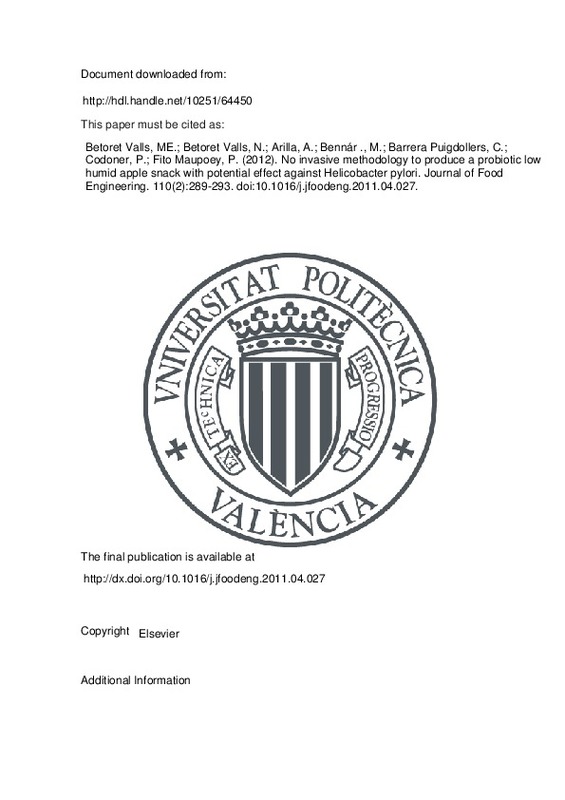JavaScript is disabled for your browser. Some features of this site may not work without it.
Buscar en RiuNet
Listar
Mi cuenta
Estadísticas
Ayuda RiuNet
Admin. UPV
No invasive methodology to produce a probiotic low humid apple snack with potential effect against Helicobacter pylori
Mostrar el registro sencillo del ítem
Ficheros en el ítem
| dc.contributor.author | Betoret Valls, María Ester
|
es_ES |
| dc.contributor.author | Betoret Valls, Noelia
|
es_ES |
| dc.contributor.author | Arilla, A.
|
es_ES |
| dc.contributor.author | Bennár ., Marek
|
es_ES |
| dc.contributor.author | Barrera Puigdollers, Cristina
|
es_ES |
| dc.contributor.author | Codoner, P.
|
es_ES |
| dc.contributor.author | Fito Maupoey, Pedro
|
es_ES |
| dc.date.accessioned | 2016-05-20T06:27:55Z | |
| dc.date.available | 2016-05-20T06:27:55Z | |
| dc.date.issued | 2012-05 | |
| dc.identifier.issn | 0260-8774 | |
| dc.identifier.uri | http://hdl.handle.net/10251/64450 | |
| dc.description.abstract | A probiotic low humid apple snack with potential effect against the infection caused by Helicobacter pylori has been developed from apple (cv. Granny Smith) and mandarin juice with a high microbial content of Lactobacillus salivarius spp. salivarius, by vacuum impregnation and hot air drying techniques. The moisture content reached in the final product (0.144 ± 0.012 gwater · g -1 sample) ensured stability, and although the drying process affected the microbial content, the concentration in the final product (9.486 ± 0.013) × 107 CFU g -1 dry sample) was sufficient to confirm that with this procedure it is possible to obtain a stable probiotic fruit with a low moisture content. Additionally, a preliminary in vivo test with five dyspeptic children was undertaken that suggested the possible effect of this new product on H. pylori as measured by a standard infection indicator. © 2011 Elsevier Ltd. All rights reserved. | es_ES |
| dc.language | Inglés | es_ES |
| dc.publisher | Elsevier | es_ES |
| dc.relation.ispartof | Journal of Food Engineering | es_ES |
| dc.rights | Reserva de todos los derechos | es_ES |
| dc.subject | Helicobacter pylori | es_ES |
| dc.subject | Lactobacillus salivarius spp. salivarius | es_ES |
| dc.subject | Mandarin juice | es_ES |
| dc.subject | Pineapple/grape juice | es_ES |
| dc.subject | Probiotic | es_ES |
| dc.subject | Vacuum impregnation | es_ES |
| dc.subject | Mandarin juices | es_ES |
| dc.subject | Probiotics | es_ES |
| dc.subject | Drying | es_ES |
| dc.subject | Moisture determination | es_ES |
| dc.subject | Fruits | es_ES |
| dc.subject | Lactobacillus salivarius | es_ES |
| dc.subject | Malus x domestica | es_ES |
| dc.subject.classification | TECNOLOGIA DE ALIMENTOS | es_ES |
| dc.title | No invasive methodology to produce a probiotic low humid apple snack with potential effect against Helicobacter pylori | es_ES |
| dc.type | Artículo | es_ES |
| dc.identifier.doi | 10.1016/j.jfoodeng.2011.04.027 | |
| dc.rights.accessRights | Abierto | es_ES |
| dc.contributor.affiliation | Universitat Politècnica de València. Instituto Universitario de Ingeniería de Alimentos para el Desarrollo - Institut Universitari d'Enginyeria d'Aliments per al Desenvolupament | es_ES |
| dc.contributor.affiliation | Universitat Politècnica de València. Departamento de Tecnología de Alimentos - Departament de Tecnologia d'Aliments | es_ES |
| dc.description.bibliographicCitation | Betoret Valls, ME.; Betoret Valls, N.; Arilla, A.; Bennár ., M.; Barrera Puigdollers, C.; Codoner, P.; Fito Maupoey, P. (2012). No invasive methodology to produce a probiotic low humid apple snack with potential effect against Helicobacter pylori. Journal of Food Engineering. 110(2):289-293. doi:10.1016/j.jfoodeng.2011.04.027 | es_ES |
| dc.description.accrualMethod | S | es_ES |
| dc.relation.publisherversion | http://dx.doi.org/10.1016/j.jfoodeng.2011.04.027 | es_ES |
| dc.description.upvformatpinicio | 289 | es_ES |
| dc.description.upvformatpfin | 293 | es_ES |
| dc.type.version | info:eu-repo/semantics/publishedVersion | es_ES |
| dc.description.volume | 110 | es_ES |
| dc.description.issue | 2 | es_ES |
| dc.relation.senia | 208591 | es_ES |







![[Cerrado]](/themes/UPV/images/candado.png)

